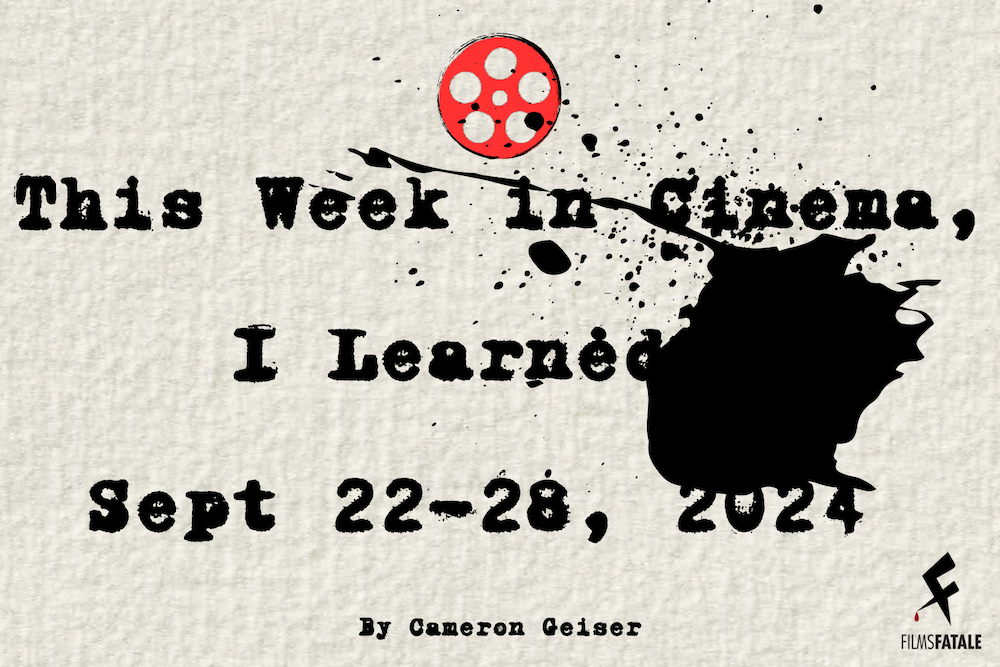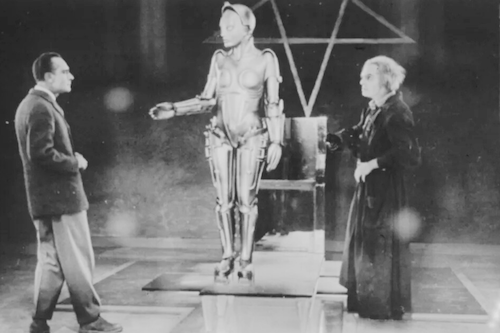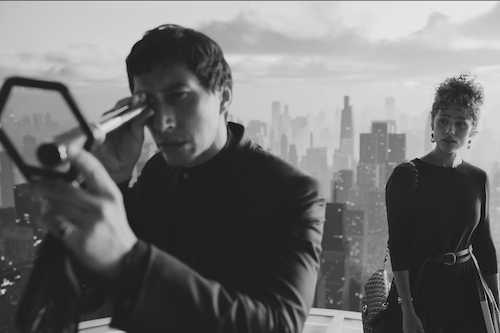This Week in Cinema, I Learned…Sept 22-28 2024
Written by Cameron Geiser
Welcome to This Week in Cinema, a yearlong film criticism project wherein I will be watching a new film that I haven't seen every single day.
This was another fascinating and strange slate of films as the final full week of September brings us closer to the edge of Horror and down the rabbit hole towards surrealism and reality warping stories. We begin with Under the Silver Lake, which is now my favorite Andrew Garfield performance to date, in a full blown Neo-Noir panic laden with conspiracy theories. The only real disappointment this week was Charlie Kaufman's stop motion puppet film Anomalisa- a truly miserable film. There are two pairings of films with two Horror films and two long gestating projects from auteur filmmakers both starring Adam Driver. The two horror films are an excellent 2024 supernatural indie flick starring David Dastmalchian and the other a John Carpenter movie from the 1990s starring Sam Neill. The two Adam Driver starring films are The Man Who Killed Don Quixote from Terry Gilliam and Francis Ford Coppola's Megalopolis. Both of which took many forms and much effort before being realized on the silver screen. The remaining title is a hugely influential silent film from almost 100 years prior.
Is there a through line for all of these films though? A lesson to be learned? All of these stories play with the notion of reality and the strangeness of existence in some way, shape or form. Sometimes it's more literal as with Late Night with the Devil or In The Mouth of Madness. Other times it's more abstract like with Under The Silver Lake or The Man Who Killed Don Quixote where our perception of reality clouds or clears how we perceive what is truth, what is real? I may not have much enjoyed Anomalisa but there are aspects of that film that shine through, like every character besides the two main characters being voiced by one person to point out the banality of modern life and how a new face can invigorate you for a time. Then there's Metropolis and Megalopolis, two sides of a similar coin with regards to their respective philosophies. Both films explore otherworldly futures and the figures that control the levers of power and the effect it has on each populace. This week I learned to fully explore surreal ideas, they may not always pan out in the end- but abstract storytelling is worth exploring to better tell richer stories in our own futures.
September 28th
Under The Silver Lake (2018)
4/5
I was quite impressed with this one. After seeing the hit indie horror It Follows from writer-director David Robert Mitchell, I was determined to check out what he did next. Hopping genres from Horror to a conspiracy riddled Neo-Noir Mystery was certainly a choice, and one that worked wonders. What makes a good mystery? In my opinion you need a stubborn, resilient protagonist who becomes obsessed with seeking the truth of the matter, whatever the cost. Sam, portrayed by Andrew Garfield here, is such a protagonist. When he meets Sarah (Riley Keough), a beautiful girl swimming in the pool of his apartment complex one night, Sam is mystified by her disappearance the following morning and investigates. This leads him down an insane conspiratorial path through Los Angeles as he uncovers a massive scheme hiding in plain sight with hints and nuggets of truth hidden in songs, movies, and even in-print publications like Nintendo Power! The score, how information is dropped to the protagonist, the editing style, shot choices and stilted dialogue are all heavily informed by Noir Cinema’s past. Under The Silver Lake is an excellent Neo-Noir and definitely worth a watch!
September 23rd
Anomalisa (2015)
2/5
Charlie Kaufman is, for me, an incredibly hit or miss storyteller. Occasionally he can produce deeply emotional and thoroughly captivating stories of sadness, fear of abandonment, or living through someone else vicariously quite literally as was done in Being John Malkovich. Other times his work can fall into self-loathing depression movies like Synecdoche, New York or I’m Thinking of Ending Things. Much like the majority of Darren Aronofsky's filmography, these are movies I like to call “Feel Bad Movies”. Anomalisa is very much a “Feel Bad Movie”. As someone who worked the Front Desk of a Hilton Hotel for years, I hate this main character on a deep level. I have no sympathy for this painfully awkward, pretentious, selfish idiot. Michael Stone (David Thewlis) is a self help author and inspirational speaker, which is hilarious given that he's the least inspirational protagonist I've seen all year. He's too wishy washy, doesn't know what he wants, has zero loyalty to his wife and child, and once he beds the shy and easily manipulated Lisa (Jennifer Jason Leigh) she too becomes one of the many, an endless sea of people who all look and sound the same.
Having Tom Noonan voice every single character besides Michael and Lisa was an inspired choice, but it doesn't lessen the oppressive weight of shame, guilt, and depression that this film lives and breathes in. The craftsmanship of the puppetry and stop motion animation are impressive and noteworthy, but it's all in service of a miserable story. Anomalisa is a story about twenty-first century loneliness, despair and alienation that's filled to the brim with dry awkward humor that never once produced a smile or even the beginnings of a chuckle. Personally, I do not recommend this movie.
September 24th
Late Night with the Devil (2024)
4/5
David Dastmalchian is one of my favorite working actors in Hollywood right now. My favorite performance of his (so far) was his take on Polka-Dot Man in James Gunn’s The Suicide Squad. He's also my casting pick for the Batman Villain Mr. Freeze if Matt Reeves were to redo another antagonist similarly to his reimagining of The Riddler with Paul Dano. That's besides the point though because we're here to talk about this absolute riot of a Horror flick, Late Night with the Devil. Jack Delroy (David Dastmalchian), a Johnny Carson wannabe, is the host of Night Owls With Jack Delroy a favorite of insomniacs everywhere and an authentic take on late night talk shows in the back half of the 1970s.
With the show in decline after the death of his wife, Jack is desperate to make this year's Halloween episode an unforgettable holiday special. Over the course of the episode things get progressively more unsettling as the show goes on. Jack has on a psychic (Fayssal Bazzi), a skeptic (Ian Bliss), and a paranormal psychologist (Laura Gordon) who just wrote a book about a traumatized teenager (Ingrid Torelli) who claims to be able to commune with demons through possession. Normally this is where I would exit as possession Horror is my least favorite corner of the genre, but this film does enough to stand out from the crowd and was legitimately entertaining throughout. I won't dive too far into plotting, but this was delightfully creepy and the last act goes completely bonkers in a wholly satisfying way.
September 25th
The Man Who Killed Don Quixote (2018)
4/5
Adam Driver has quite the career of working with several of the biggest name filmmakers of all time. With The Man Who Killed Don Quixote and Megalopolis this week holds two longtime passion projects with Driver in the lead. Which got me thinking about the long list of excellent filmmakers that Driver has worked with, including Spike Lee, Martin Scorsese, Steven Soderbergh, Jim Jarmusch, Noah Baumback, and The Coen Brothers to name a few. Adding Terry Gilliam and Francis Ford Coppola to that list only layers Adam Driver's impressive resume that much more. The Man Who Killed Don Quixote plays with the notion of perspective and absurdity when American filmmaker Toby (Adam Driver) returns to Spain near where he had made his short film as a student that he is now remaking for a feature length adaptation. While Toby is currently screwing up his own production, he flees the problems he's creating by riding off to find the small town he shot his short film in. When he rediscovers the hilltop village, memories flood his consciousness as he recalls the townsfolk and the original actor he got to portray Don Quixote. He soon finds out however, that the old Cobbler (Jonathan Pryce) has stayed in character as Don Quixote this entire time. In fact, he firmly believes that he IS Don Quixote. What follows is an adventure in storytelling that explores our perceptions of reality and stories within stories. I found this one to be decidedly entertaining and worth the long gestation in Terry Gilliam's mind all these years.
September 26th
In The Mouth of Madness (1994)
4/5
The other Horror film this week is another John Carpenter film I hadn't yet seen with In The Mouth of Madness. John Trent (Sam Neill) is an insurance investigator hired by the publisher that sells popular Horror Author Sutter Cane’s (Jürgen Prochnow) novels. The publishers cannot get in contact with the Author and they want Trent to investigate. Trent obliges, but he is very skeptical about the strange ongoings reportedly afflicting readers of Sutter Cane’s work. Even after being attacked by Cane’s editor in broad daylight, the first person to read the latest manuscript, Trent doesn't buy into the supernatural possibilities but embarks to Sutter Cane’s last known whereabouts. I found In The Mouth of Madness to be visually spectacular, creepy and atmospheric, and darkly comedic as the pairing of Sam Neill and John Carpenter was peak sarcasm and nihilism blended beautifully. I loved the inventive practical effects and visual ideas.
One scene had Trent peering into giant pages of Sutter Cane’s latest Novel with a hole punched through it as interdimensional Terror lurks beyond the darkness, eventually bursting forth in pursuit. I also love the idea that Sutter Cane is very much a stand-in for Stephen King, which is doubly ironic given that John Carpenter had already adapted one of King’s Novels years prior in Christine (More on that film in October). It's very much a reality warping story, and one that I heartily recommend!
September 27th
Metropolis (1927)
2.5/5
This is one of those films that every student of film watches at some point. I knew I would eventually get around to watching Metropolis, but I did find it somewhat funny that I ended up making a double feature out of seeing this film and Megalopolis on the same day. Almost 100 years apart, and yet the two films have more connecting them than just similar titles. Both films are very much concerned with class struggles, navigating the labyrinth of massive cityscapes and how to move forward as a people. Though each film does have different ideologies about the future and the role that technology and science plays in each story. Metropolis warns that the power of scientific strides in invention and technological advancement will become the weapons of demagogues. Megalopolis takes the opposite view with humanity being at a crossroads. We, as a species, could remake society into an equitable and more fair community for everyone - or we could descend further into base motivations fueled by greed and lust.
Megalopolis sees science and industry as tools for empowerment whereas Metropolis is more wary about the future, likely influenced by how society operated in the gilded age- cruelty and profits over basic humanity and health. Metropolis is visually impressive, especially for its time. It influenced the look and feel of many of the most memorable science fiction films of our time. Films like Blade Runner, The Fifth Element, Alphaville, Batman (1989), and even Escape From New York- they all owe a debt of gratitude to Metropolis. This is all to say that I know this film was important in film history, but I didn't connect to it much at all during my watch of the film. Maybe I just had an off day, but other than the insanely impressive production design, this one wasn't for me.
September 28th
Megalopolis (2024)
3.5/5
Now this is Art. What a wild movie. Personally, I loved this film. While not all of it worked, we need more big creative swings where filmmakers have the chutzpah to create more enthusiastic films like this. I would take twenty more films like Megalopolis over whatever Dwayne “The Rock” Johnson does next... which I believe is the oddly Superheroic Christmas Movie Red One? Hard pass. Anyways, this film is incredibly ambitious and brimming with ideas, wild performances, strange plot points, and abstract visual ideas where everything is symbolic. There's a lot of monologues, occasionally literally Shakespearean, and sometimes certain characters feel like they're in entirely different stories. It's strangely effective in certain scenes? Shia LaBeouf's character just doesn't have eyebrows for a third (half?) of the film and I certainly didn't need to see his unkempt pubes at one point, but hey, he and Aubrey Plaza are having a ball overacting all over this thing.
The main conflict of the film is between two powerful men in New Rome who have diverging ideas about where to take the city going forward. Mayor Cicero (Giancarlo Esposito) wants to demolish a section of the city for a giant Casino whereas Cesar Catilina (Adam Driver) is a genius architect that discovers a new technology called Megalon with which he wants to forge a utopia for the betterment of humanity with a focus on education and growth. While the writing is clunky at times, the cinematography and visual ideas on display were inventive and there were enough fun ideas in play to keep things interesting. Oh and by the way Cesar can control and manipulate time? Somehow that is only an aside in Megalopolis, but I appreciated the almost blind optimism of the script and Francis Ford Coppola himself. When I got home a friend asked what I thought of the film, my response? Megalopolis is like having lunch with your Grandpa after he returned from international travel where he discovered psychedelic drugs.
Cameron Geiser is an avid consumer of films and books about filmmakers. He'll watch any film at least once, and can usually be spotted at the annual Traverse City Film Festival in Northern Michigan. He also writes about film over at www.spacecortezwrites.com.










